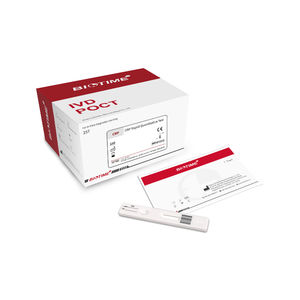
- Laboratory
- Laboratory medicine
- Inflammatory disease test kit
- Xiamen Biotime Biotechnology Co., Ltd.

- Company
- Products
- Catalogs
- News & Trends
- Exhibitions
Inflammatory disease test kit BIOT-YG-I, FLI-600for serum amyloid Awhole bloodimmunoassay
Add to favorites
Compare this product
Characteristics
- Applications
- for inflammatory diseases
- Tested parameter
- for serum amyloid A
- Sample type
- whole blood
- Analysis mode
- immunoassay
- Format
- cassette
Description
Serum amyloid A (SAA) is a major acute-phase protein in human beings and dogs. The level of SAA proteins in the blood increases within just a few hours following the onset of various inflammatory stimuli. These include infection, trauma, and surgery
Clinical Significance
Its concentration depends on clinical findings of the patient, illness activity and the therapy applied. SAA increases moderately to markedly (100-1000 mg/l) in bacterial and fungal infections, invasive malignant diseases, tissue injuries in the acute myocardial infarction, and autoimmune diseases such as rheumatoid arthritis and vasculitis. Mild elevation (10-100 mg/l) is often seen in viral infections, systemic lupus erythematosus, localized inflammation, or tissue injuries in cystitis and cerebral infarction. SAA as a sensitive, non-invasive parameter is used in organ transplantation where an early and correct diagnosis is needed as well as where prompt therapy is required. Besides acute kidney allograft rejection, SAA is used to diagnose rejection after liver transplantation, simultaneous pancreas, and kidney transplantation, and bone marrow transplantation (acute "graft vs. host disease").
Catalogs
No catalogs are available for this product.
See all of Xiamen Biotime Biotechnology Co., Ltd.‘s catalogsOther Xiamen Biotime Biotechnology Co., Ltd. products
Inflammation Markers
Related Searches
- Assay kit
- Blood assay kit
- Serum assay kit
- Immunoassay assay kit
- Plasma assay kit
- Infectious disease detection kit
- Blood rapid diagnostic test
- Rapid lateral flow test
- Immunoassay rapid diagnostic test
- Rapid virus test
- Whole blood detection kit
- Respiratory infection test kit
- Serum rapid diagnostic test
- Plasma rapid diagnostic test
- Optical assay kit
- Clinical assay kit
- Infectious disease rapid diagnostic test
- Whole blood rapid diagnostic test
- Cassette assay kit
- Fluorescence assay kit
*Prices are pre-tax. They exclude delivery charges and customs duties and do not include additional charges for installation or activation options. Prices are indicative only and may vary by country, with changes to the cost of raw materials and exchange rates.





